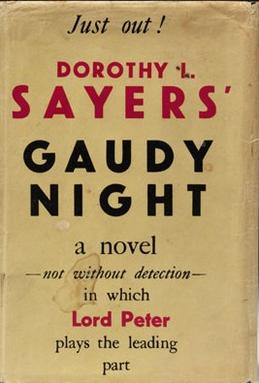
Gaudy Night (1935) is a mystery novel by Dorothy L. Sayers, the tenth featuring Lord Peter Wimsey, and the third including Harriet Vane.

A student is a person enrolled in a school or other educational institution.

The University of St Andrews is a public university in St Andrews, Scotland. It is the oldest of the four ancient universities of Scotland and, following the universities of Oxford and Cambridge, the third-oldest university in the English-speaking world. St Andrews was founded in 1413 when the Avignon Antipope Benedict XIII issued a papal bull to a small founding group of Augustinian clergy. Along with the universities of Glasgow, Aberdeen, and Edinburgh, St Andrews was part of the Scottish Enlightenment during the 18th century.
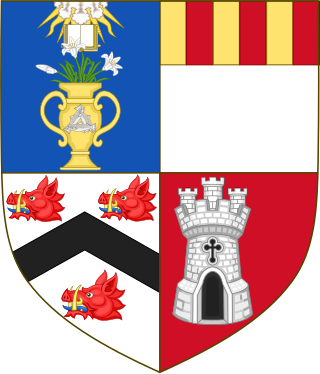
The University of Aberdeen is a public research university in Aberdeen, Scotland. It was founded in 1495 when William Elphinstone, Bishop of Aberdeen and Chancellor of Scotland, petitioned Pope Alexander VI on behalf of James IV, King of Scots to establish King's College, making it one of Scotland's four ancient universities and the fifth-oldest university in the English-speaking world. Along with the universities of St Andrews, Glasgow, and Edinburgh, the university was part of the Scottish Enlightenment during the 18th century.

A promenade dance or promenade, commonly called a prom in American English, is a dance party for high school students. It may be offered in semi-formal black tie or informal suit for boys, and evening gowns for girls. This event is typically held near the end of the school year. There may be individual junior and senior proms or they may be combined.
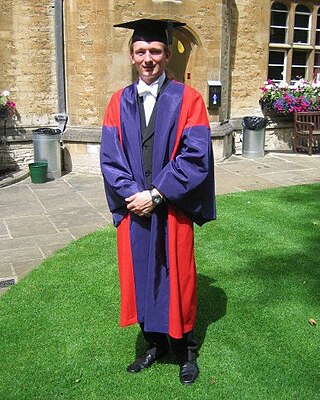
Academic dress is a traditional form of clothing for academic settings, mainly tertiary education, worn mainly by those who have obtained a university degree, or hold a status that entitles them to assume them. It is also known as academical dress, academicals, and, in the United States, as academic regalia.

Matriculation is the formal process of entering a university, or of becoming eligible to enter by fulfilling certain academic requirements such as a matriculation examination.
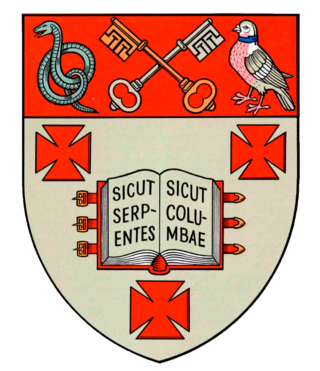
Radley College, formally St Peter's College, Radley or even the College of St. Peter at Radley, is a public school near Radley, Oxfordshire, England, which was founded in 1847. The school covers 800 acres including playing fields, a golf course, a lake, and farmland. Before the counties of England were re-organised, the school was in Berkshire.
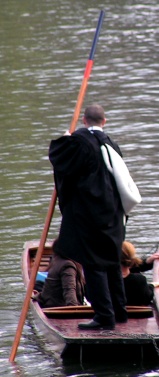
The University of Cambridge has a long tradition of academic dress, which it traditionally refers to as academical dress. Almost every degree which is awarded by the University has its own distinct gown in addition to having its own hood. Undergraduates wear college gowns, which are all subtly different; these differences enable the wearer's college to be determined. Academic dress is worn quite often in Cambridge on formal, and sometimes informal, occasions, and there are a number of rules and customs governing when and how it is worn. Black gowns (undress) are worn at less formal events, while on special occasions full academical dress is worn, consisting of gown, hood and headdress with Doctors in festal dress. The University's officials also have ancient forms of academic dress, unique to the University.

Homecoming is the tradition of welcoming back alumni or other former members of an organization to celebrate the organization's existence. It is a tradition in many high schools, colleges, and churches in the United States and Liberia.

Basser College, University of New South Wales is a residential college at the University of New South Wales in Sydney. Basser College and its two neighbouring Colleges, Goldstein and Phillip Baxter, are collectively known as the Kensington Colleges.
Encaenia is an academic or sometimes ecclesiastical ceremony, usually performed at colleges or universities. It generally occurs some time near the annual ceremony for the general conferral of degrees to students. The word is from Latin, meaning dedication or consecration, and is ultimately derived from the Ancient Greek ἐγκαίνια (enkainia), meaning a festival of renewal or dedication, and corresponds to the English term commencement.
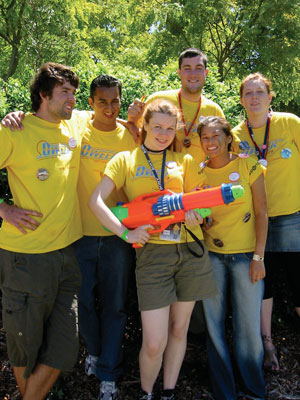
Student orientation or new student orientation is a period before the start of an academic year at a university or tertiary institutions. A variety of events are held to orient and welcome new students during this period. The name of the event differs across institutions. Post-secondary institutions offer a variety of programs to help orient first year students. These programs can range from voluntary community building activities to mandatory credit-based courses designed to support students academically, socially, and emotionally. Some of these programs occur prior to the start of classes while other programs are offered throughout the school year. A number of research studies have been done to determine the factors to be considered when designing orientation/transition programs.

A common room is a group into which students are organised in some universities, particularly in the United Kingdom, normally in a subdivision of the university such as a college or hall of residence, in addition to an institution-wide students' union. They represent their members within the hall or college, operate certain services within these institutions such as laundry or recreation, and provide opportunities for socialising. There are variations based on institutional tradition and needs, but classically the following common rooms will exist:

Formal hall or formal meal is a meal held at some of the oldest universities in the United Kingdom and the Republic of Ireland at which students usually dress in formal attire and often gowns to dine. These are held commonly in the colleges of Oxford, Cambridge and Durham, at Trinity College Dublin and Royal Holloway, University of London, in some halls and colleges of St Andrews, and the Australian sandstone universities, and at Trinity College, Toronto.
Aberdeen University Students' Association is the students' association of the University of Aberdeen, an ancient university in the city of Aberdeen in North East Scotland. It organises recreational activities; provides welfare and employment services for students; promotes equality and diversity of students; advancement of education; and provide facilities and support for student societies and sports clubs.

A freshman, fresher, first year, or colloquially frosh, is a person in the first year at an educational institution, usually a secondary school or at the college and university level, but also in other forms of post-secondary educational institutions.
The ancient university governance structure in Scotland is the organisational system imposed by a series of Acts of Parliament called the Universities (Scotland) Acts 1858 to 1966. The Acts applied to what were termed the 'older universities': the University of St Andrews, the University of Glasgow, the University of Aberdeen and the University of Edinburgh. Together these four universities are commonly referred to as the ancient universities of Scotland. Whilst the Acts do not directly apply to the University of Dundee, the same governance structure was ordained for use by that institution in its royal charter.

Undergraduate gowns are a notable feature of academic dress for students at the ancient universities in Scotland.
The procedures and traditions surrounding academic graduation ceremonies differ around the world.














